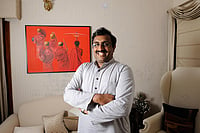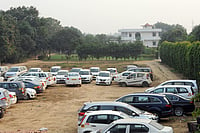Shehla Rashid, vice-president of the JNU Students’ Union, is the fire breather in the movement for the release of the Union president, Kanniah Kumar. Rashid, a 27-year-old MPhil student at JNU, has been at the forefront of the organization and direction of the movement. Excerpts from an interview with Anoo Bhuyan:
In this current scenario, who defines who is a patriot and who isn’t? Should anyone be allowed to?
There’s a very majoritarian kind of sentiment in place today which is being allowed to define and dominate the discourse on nationalism. Much of this is structured in a very mob-like way. This goes back to 2012 when Narendra Modi was being projected as the prime ministerial candidate At that time Narendra Modi put his massive PR machinery to work and anyone who said anything about him, people would call them anti nationals. Today this is the reality. This sort of mob which was at the fringe a while ago has acquired the mainstream character. There are 2 things here -- communalism and development. If you question communalism or development narrative you are deemed anti national. It is this mob, this jingoist mob which is allowed to define who is national and anti-national -- that’s a tragedy.
We’re all debating this existential question – who is an Indian, who isn’t. Do you think this is that moment when this question becomes the biggest question of this 5-year term?
I think it’s going to get worse. I think the tipping point will be when the elections in West Bengal and Uttar Pradesh draw closer. I forsee riots in Uttar Pradesh. I forsee riots coming up in West Bengal. This might just be a trailer. This might not be the worst thing that is happening. Our movements for justice, our movements for Rohit Vemula, those really exposed the BJP govt. However they’ve been able to make a come back, saying “Don’t trust these students, we were always saying they’re anti national and now it’s proved” However this is always a dialectic. Even in the setback we have received, the set back of Kannaiya has worked against them.
Few years ago when the AAP and anti corruption movement was on, we saw this big uprising, the middle class joined, and then it was over. People wondered if there will be another mass mobilization…
If you look at the parliament, there is no opposition right now. The opposition to the wrong polices of the government is not coming from the other parties but from the students. People started aligning with power and not questioning power. Students have been the force that always stood up for what is right. For the last man. For the most vulnerable sections of society. We are facing this attack not because someone shouted any slogans. We are facing this attack because we stood up for the right thing. The role of the students today is much bigger. What does it mean to be a student. To question. As students that is something which should be our first priority. Not just question the opposition, also question ourselves. We have to take up difficult discourses. The university has to be a place where vulnerable sections of society with opposite ideas can live with dignity. That is how we imagine the university space and the whole country. The entire country should be a place of bitter political debates but also tolerant.
What is going to happen to your academic demands and the elevated issues in the sense of caste, politics etc? Is it a good idea to mix the two?
Even without us doing anything, these movements have acquired a cohesion in a sense. During the occupy UGC movement for fellowships, we saw an unprecedented network of students around the country. Even without us having to do anything, the justice for Rohit and UGC movement did acquire cohesion, they came together in a sense. This network is turning into anger against the government. This will turn into a deathbed for the RSS agenda. All movements from Hokolorob or Pinjra Tod to Occupy UGC to Vemula.. all of these have come together without having to do much.
Are the comparisons with the Emergency valid?
I haven’t lived the emergency I was born in 1980s. But from what we hear from the people, that was declared, this was undeclared. Clearly the things happening -- Police raiding campus, arresting JNUSU president -- this hasn’t happened since the Emergency. Terms like intolerance are too mild for this. This is fascism. It is fascism that you go to a court where you are supposed to seek justice and you are attacked and lynch mobbed in police presence. This is something more than the Emergency, this is something more than intolerance. What’s the difference? In the emergency it is the institutions that were suspended. But the people, at the level of consciousness they were strong and they overthrew the emergency. I hope that happens now too, that in the next election BJP is wiped out.
What RSS has done, from their pattern of working, it’s not so much about the institutions anymore. It has created those seeds of discord among common members of society. If India is still safe as a country and liveable, it is not because of the institutions. Apart from the Supreme Court and a few others, our institutions are defunct. It is because of the people at the very local level, because of the cordial relations among people, that we survived as a society. But RSS seeks to destroy precisely that. It doesn’t seek to suspend the institutions. It seeks to suspend the good sense of the people. They are trying to suspend the very social fabric and introduce a rot into the social fabric.
I’m not sure as a society whether we will be able to survive that. That is something you saw in Hitler’s Germany -- that people gave away their neighbours. People also saved their neighbours. But overall this pattern of unquestioning obedience to one great leader who is beyond any doubt: This is actually very dangerous. As a society I don’t think India has ever been this, that doesn’t question. That’s why Amartya Sen writes the argumentative Indian. But now it’s the obedient Indian were looking at. The comparison should be with Nazi Germany. I hope it recovers from that.
On February 9, were you at the Afzal Guru event?
Initially I was there. Union members have to be present. We were there initially. ABVP was sloganeering on one side. If someone wants to conduct a programme they can, if ABVP wants to protest, they can peacefully. There were some slogans which we dint really endorse. They did stop for a while. I personally said please don’t raise such slogans, this is not right. After that we left. Some union members were there to ensure that march takes place peacefully. Mere chanting of a slogan doesn’t amount to sedition. Yet we disagree with those students and we don’t endorse them.
When you were there did you know it was going to question the hanging?
There are 2 questions here. Is anyone allowed to hold a program on Afzal guru? That’s something we need to clear out first. I think yes. If we’re going to crush dissent like this were not going to get anyone on our side by crushing them. Many national law universities have had seminars on the Afzal guru case. Justice AP Shah has questioned it and made bold statements on it. Are we going to put all of these people in jail for speaking? Does anyone have a right to organize a protest? Yes, we have a right to have a programme. Yes, we think they have a right to organise an event. We are not asking the vice chancellor to officially endorse it. These are 10 students organizing an event at a dhabba. I think they can do that. Then comes the question whether we think Afzal guru is a martyr. Organizationally we may have several differences over it. In JNU even among the left there is a spectrum or organizations whose positions on Afzal Guru are qualified and graded. Now, can ABVP use police might to stop these events? No we don’t think they can. They can express their dissent. Just because their government is in power and Delhi police comes under MHA, can they go around policing people using their state might?
To what extent do you think ABVP can go to show their dissent?
The university is a place where you can question the law. If the police comes in and enters our class room and says “you know what you can’t have a discussion on section 377 because Supreme Court has said this, this is contempt of court,” I think as a society we will go nowhere in production of knowledge. We know how the police acts. The police is not just. Police acts under the influence of whoever is powerful. Even if the Left misuses the state might, we have to question that too. University is the place where you will question. If you take examples of Singur Nandigram, it was the left using its state might to crush dissent. Which was the only campus that stood up for it at that time? It was the JNU campus which is dominated by the left. The critics of the Left doesn’t come so much from the right wing. They are okay with a lot of things.
So does anything constitute sedition as far as you are concerned?
Sedition, the way it is defined is problematic at the moment. “Disaffection for the government” is colonial baggage. What is a crime and what is not a crime is defined very much by the powerful structures. Now marital rape is not a crime, but we know that it is. There are so many things which do not constitute a crime. But what should we work towards? Policing? There is no end to this. The approach and solution is not jailing people, solution is that you work for a just society. I think what we need to do is not so much penalization but working for a just society where everyone feels part of the society. And I think that’s absolutely possible and JNU is an excellent example of that. Here you have women presidents defeating male candidates by 2200 votes, you have students standing up for workers rights, you have workers standing up for student’s hostel rights. This controversy is also a time when we can reinforce what JNU stands for. JNU stands for the dream of a just society which we can actually realize.
This web-exclusive Interview does not appear in print magazine.


















.jpg?w=200&auto=format%2Ccompress&fit=max)







